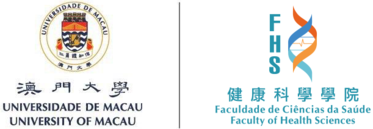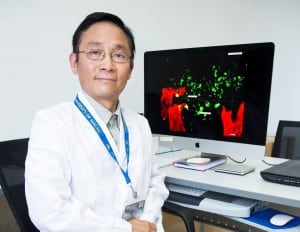Prof. Xu Ren-He, a full professor internationally recruited by Faculty of Health Sciences, has discovered through his latest research that an embryonic stem cell-based approach can be used to tackle multiple sclerosis. If successful, this approach can bring enormous benefits to patients with multiple sclerosis and probably other autoimmune diseases as well.
The study, “Human ESC-Derived MSCs Outperform Bone Marrow MSCs in the Treatment of an EAE Model of Multiple Sclerosis”, was published in the prestigious Cell Press journal Stem Cell Reports. “Multiple sclerosis is a chronic autoimmune disease in the brain and spinal cord. Patients often have impaired vision, abnormal cognition, ataxia, and even paralysis as seen in stroke patients. Current therapies are mainly palliative and often cause severe side effects. There is no cure at all,” says Prof. Xu.
His team has demonstrated that human embryonic stem cell (hESC) derived mesenchymal stem cells (hES-MSC) significantly reduce the severity of disease in an animal model of multiple sclerosis, and that hES-MSC offer much better efficacy than human adult bone marrow derived MSC (BM-MSC). BM-MSC are currently being tested in clinical trials for multiple sclerosis and other autoimmune diseases. However, this cell therapy has been restricted by the limited number of bone marrow donors, variation in quality among different samples, and concerns about potential transmission of pathogens. Thus, BM-MSC may not be an ideal cell therapy. In contrast, hESC can be expanded indefinitely and are easy in quality control. A single hESC line can be continuously used to generate MSC with consistent quality, which perfectly fulfils the requirements for pipeline production of clinical-grade MSC. The authors of the paper also found that hES-MSC express little pro-inflammatory factors like interleukin 6 and penetrate the blood-brain barrier to migrate into the central nervous system, which might also contribute to the therapeutic effect of hES-MSC. Prof. Xu’s team is currently further elucidating the molecular mechanism for the actions of hES-MSC. Through ImStem Biotechnology, Inc., a company established in the United States by Prof. Xu and his colleagues, they are working for the approval of the Food and Drug Administration to make this treatment available to patients.
Prof. Xu is a professor of the Faculty of Health Sciences at UM. His research focuses on elucidating the regulation of pluripotency and exploring the translational potential of pluripotent stem cells. He was the director of University of Connecticut Stem Cell Core, and a senior scientist of WiCell Research Institute founded by Prof. James Thomson, who first derived hESC lines in the world. Prof. Xu has published more than 50 papers in biomedical journals including Nature Biotechnology, Nature Methods, Cell Stem Cell, PNAS, and Stem Cell Reports. He also possesses several patents derived from his research. For more details, please visit Prof. Xu’s website : https://fhs.um.edu.mo/staff/academic-staff/xu-ren-he/.


